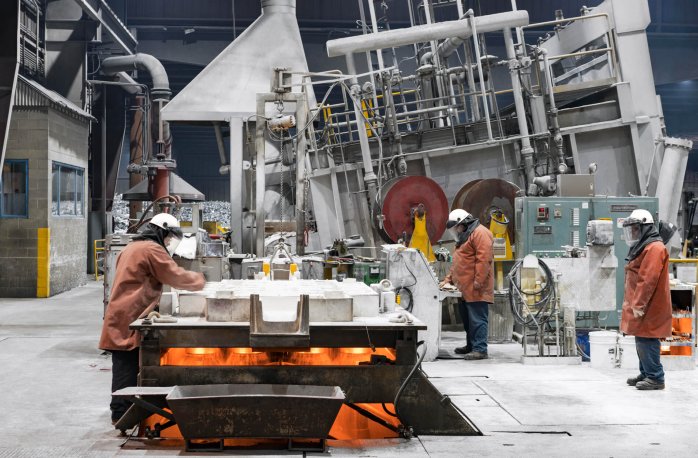“Our latest heat treatment plant will require around 60% less natural gas than existing technology.”


“Compromises in favor of energy efficiency are required”
Energy is one of the most important resources to RONAL GROUP. The organization had already been focusing on increasing energy efficiency in production long before the current energy crisis, but now it is doing so more than ever. Rainer Schödel, Group Energy and Data Engineer, was interviewed on the subject of energy efficiency.
To what extent is the energy crisis fueling the move toward greater energy efficiency at RONAL GROUP?
RAINER SCHÖDEL The topic of energy gained greatly in significance when electricity and gas shortages were threatened last fall. At the same time energy prices also rose significantly. RONAL GROUP is therefore highly motivated to implement energy-saving initiatives that make economic sense and can be put into practice in the short term. And that’s across the board. A great many improvements, both small and large, have already been made, while at the same time our energy KPIs have remained high. We want to continue these efforts in order to reduce the energy required per wheel, both substantially and sustainably.
What specific actions can an organization such as RONAL GROUP take to become more energy efficient?
RAINER SCHÖDEL Operational optimization measures are simple actions that can be implemented quickly and which do not usually require any investment. Lowering temperatures, for example, lowering air pressure and cutting down idle times. However, production planning that takes into account the utilization of machines and equipment is also important. Good availability and quality of data are essential here for identifying and documenting improvements. New plants also have a major impact. Our latest heat treatment plant will require around 60% less natural gas than existing technology.
What about actions that go beyond operational optimization? How quickly can these be implemented?
RAINER SCHÖDEL Optimizing energy efficiency with new equipment (e.g. a recuperator) requires a certain amount of time for planning, delivery, installation and commissioning. Availability of budget and technical staff also goes hand in hand with this. Implementing this kind of action can take anything from six to nine months. New technologies, such as RONAL Smart Casting (RSC), have a big impact but also need more time.

RONAL GROUP is looking to be carbon-neutral by 2050. What needs to be happening now?
RAINER SCHÖDEL Forward-looking planning, including consistent management throughout the period, is crucial to success. It is important to be aware of the levers available today and in the future, and to use them successively – including them as part of future major projects and within the multi-year forecast.
In which areas are we already well on our way and where do we need a little more momentum?
RAINER SCHÖDEL In our last major project (at a factory in Spain), we demonstrated that energy efficiency can be palpably improved if it plays a role in the planning stage, and organizational processes are adhered to. Costs throughout the entire life cycle were taken into account rather than just focusing on the budget. As a result, energy-related manufacturing costs noticeably decreased. On the other hand, there is still room for improvement in the multi-year forecast. When it comes to replacement programs or new acquisitions, the potential for improving energy efficiency – or the technology itself – rarely plays a role overall in the big picture. Key factors these days are primarily budget and deadlines.
Could the current crisis accelerate the transformation of the energy system – or even trigger development towards energy self-sufficiency for industrial companies?
RAINER SCHÖDEL If we are going to talk about possible “acceleration”, then availability of data and financial and human resources should also be part of the discussion. We also need to consider whether the hardware required is available. From my point of view, acceleration is not what is needed, but rather the willingness to pursue goals steadily and consistently. Improvement of 2% per year is technically and organizationally feasible, and would roughly mean halving consumption by 2050. Major projects, on the other hand, provide the opportunity to take larger steps in a shorter period of time. This means the “ideal factory” could already manage with half the energy consumption per wheel. However, this would require compromises in favor of energy efficiency. This willingness to compromise is not always there at the moment.

Rainer Schödel has been the Group Data Energy and Data Engineer at RONAL GROUP since 2017.




